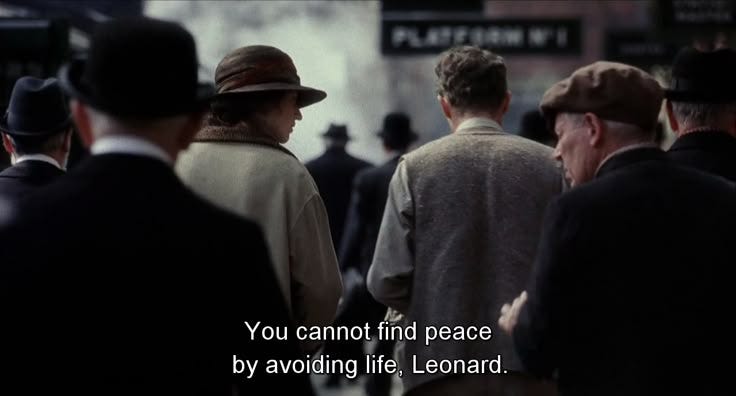I play a game with myself when I’m at my pilates class: it’s called Don’t Check The Clock. It’s where I have to go the entire class without glancing at the clock at the back of the studio to see how much time we’ve got left. I’ve won a total of zero times. It’s a little funny. I can’t help it. I’ve been going to these pilates classes for over three years, it’s the workout I enjoy the most, yet I can’t go an entire class without checking at least once to see how close it is to being over.
I notice this in many areas of my life: a constant glance into the future and an inability to be fully in the present. It manifests in different ways; I’ll be reading a book and be constantly, annoyingly aware of how far I am from finishing it, how many pages I’ve got left. And that’s with books I genuinely enjoy. It doesn’t come from boredom, it doesn’t come from doing the wrong kind of activity - it comes from simply having forgotten how to just be here.
There’s a few big reasons why. The first one is that we’re increasingly conditioned to chase outcomes and get dopamine hits from being ‘productive’. In every piece of popular technology right now you’ll find ways to give you those hits. Completing your step goal, logging your books read and movies watched, turning everything into something measurable and quantifiable and somehow into a marker for progress. Progress towards what? Towards being more productive? Having checked more boxes? Whatever that means. Because it’s definitely not progress towards living a better life. When we’re focused only on how many things we can complete and quantify, we’re subconsciously not focused on living and experiencing them. Our energy is not fully present in the thing we are experiencing, but at its end, anticipating its completion.
We learn to derive meaning from progress. Ambitious people, especially, can easily fall into that trap where self-worth is tied to an overall notion of some kind of progress. It’s even harder then to learn to derive meaning not from progress, but from stillness - from simply just being here. It’s like without meaning to, we tied our self-worth to what we can finish rather than what we can feel.
So what’s the second big reason? You don’t need me to be the one to tell you that yes, of course it is those damn phones. I’m a part of Gen Z, a generation that still had a childhood without being labeled as iPad kids, but then had our most formative years with social media playing a huge role. We got to experience both what it’s like to have your full attention, and what it’s like to lose it. Gen Alpha is now growing up watching YouTube Shorts at age 8. When I was 8, I hadn’t yet experienced social media dopamine - all I knew was fully immersing myself in a 6-part book series for hours at a time with no one and nothing out there to get my attention.
Now, everything is competing for your attention, and your brain is trained to expect it. We’re wired for constant stimulation. Reading a book for five hours straight is a much bigger fight for our brains than it used to be, because there’s nothing slow or present about digital life - it’s just next, next, next. Constant stimuli. So of course it takes more to focus. We have to keep reminding ourselves that life is not inside our phone screen, it’s right outside of it. We’re in a phase where the simple act of being present, one of the most fundamental things we can do to experience life, has to be intentionally valued and practiced. It has to be relearned.
And the third reason in my opinion is that most people don’t learn how to process their feelings or how to sit with them. Being fully present requires you to feel safe and comfortable with everything that the present holds. How many people do you know without things they’re pushing to the back of their head so they don’t have to deal with them, revisit them or accept them? Emotional education, one of the most essential things we need to learn, is not something that’s taught - the most emotionally healthy people I know have done so much intentional work with themselves to get there. Being in the present often means facing insecurity, grief, anger, fear, anxiety; and how are we meant to sit with that if we’re used to pushing it aside because it’s inconvenient and heavy? I think that to get the ability to be fully present, you need to learn to sit with your feelings and genuinely value them and yourself.
In presence, there’s no escaping from what is. Many people are afraid of stillness because they’d rather avoid what it tends to reveal. So instead, we stay in motion, because of course it’s a self-protection instinct.
I guess we’re not really taught to value presence, neither is it something that society shows you is ‘rewarding’. Productivity is valued a lot more than presence, and the cost of that is that productivity favors our output-obsessed culture while presence favors people experiencing fuller lives.
And I do say this as someone who runs a business and has been shaped in a productivity-first environment. But there are ways to be productive and present, they’re not mutually exclusive. Presence is what makes ambition and productivity worth it and gives them any meaning. It doesn’t matter how much we accomplish if we don’t slow down and actually experience it.






so relatable and well written, deriving meaning from progress is such a double edged sword
beautifully written! can say i'm going through the same thing i.e productivity over presence. How do you think i can start to gradually change that? I thankfully don't push my feelings away..